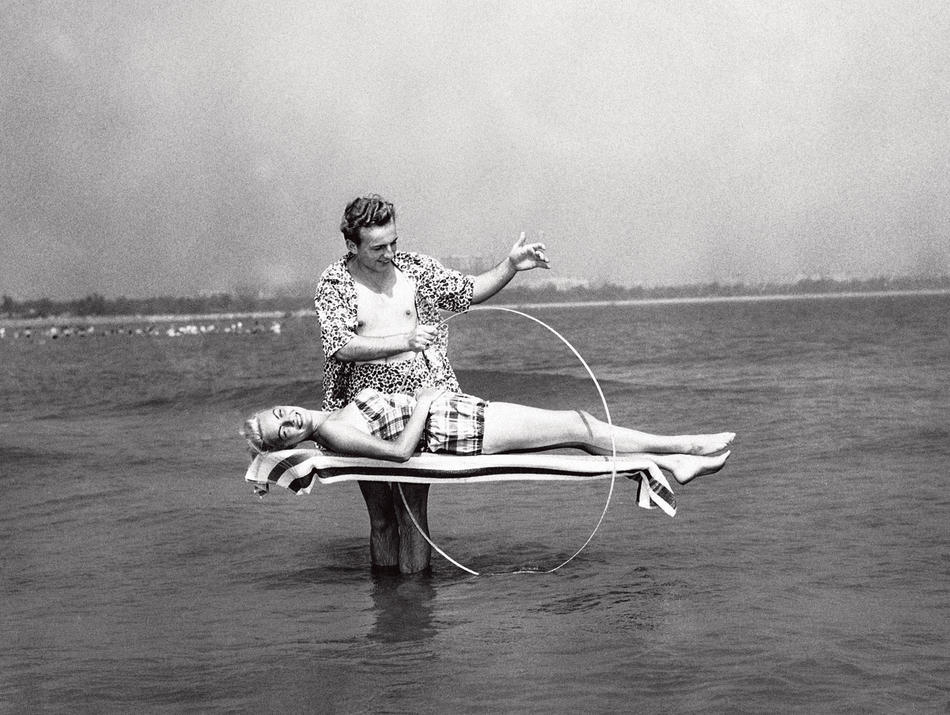It’s not every day that a book makes you levitate from your chair and travel halfway across town to see if an ordinary pizzeria is as extraordinary a place as your entranced brain imagines it to be. But that’s what may well happen when you finish reading Fooling Houdini: Magicians, Mentalists, Math Geeks, and the Hidden Powers of the Mind, by Alex Stone ’11GSAS.
Stone’s memoir about his lifelong fascination with magic is transporting almost from the opening page. Partly it’s because he is so candid about what attracts him to magic as a youngster in the first place: hoping it will help him navigate awkward social situations and meet pretty girls. In reality, he winds up spending the bulk of his youth with “pasty male virgins.”
“For me, discovering the world of magic was like finding my own island of misfit friends, a place where everyone was special in the wrong way. Magic, let’s face it, is a pastime for misfits, an outlet for outcasts with low self-esteem ... With magic tricks, you can seem extroverted and outgoing while still maintaining a safe social distance. Magicians hide in the spotlight, much in the way that photographers often mediate their social experiences from behind a lens and comedians hide behind jokes. Like physics, magic is all about nerds playing god with the universe.”
But this isn’t a book about smoke and mirrors. Stone becomes more seriously involved in magic while pursuing a PhD in physics at Columbia; he is intent on discovering the scientific principles that underlie almost every magic trick he learns. Why do people take pleasure in deceiving others, and in being deceived? What are the cognitive mechanisms at work when a person performs and watches a magic show? How does the brain process what it perceives to be reality? How reliable are our memories? “Strange as it may sound,” he writes, “studying magic ultimately leads you to ponder some of life’s deepest mysteries.”
The characters Stone encounters on his quest are rendered with a true writer’s eye for detail. “With his black Stetson hat, lizard-skin boots, and wide Doc Holliday moustache the texture of dried tumbleweed, Richard Turner looks like a saloonkeeper from the Badlands, a Victorian-era cowboy, or a ghost town tour guide.” Turner, one of a series of off-campus magicians Stone meets on his journey, turns out to be less a cardsharp than some kind of hand acrobat, able to execute perfect one-handed shuffles with a deck in each fist simultaneously. Not one to keep an academic distance, Stone hunches in close enough to smell “the lanolin-and-mango lotion he applies three times daily to keep his skin moist and supple.”
You don’t even have to be terribly interested in the subject of magic to find Stone’s factoids irresistible, as for example this one: that historically, when long fingers proved a hindrance in executing certain maneuvers, some early magicians would amputate their fingertips. Or this: that at today’s magic shows you can distinguish other magicians in the audience because instead of applauding at the end of the trick, as laypeople do, they “clap during the seemingly uneventful moments when the secret moves occur. To the untrained eye, it’s as if the magicians are clapping at nothing.”
The deeper Stone becomes obsessed, the more riveting his account is. By the end of the book, he’s become a full-fl edged “magicaholic” with a pack-a-day habit (he likes his playing cards crisp), winging to magic conventions all over the world (there are more than a hundred such each year), even trying to inveigle himself into the good graces of a rough gang of three-card monte players on Canal Street (where they’ve relocated since being chased from Times Square by Giuliani’s cleanup). He’s lost his girlfriend — magic, it seems, has a way not of conjuring women, as he had hoped, but of making them disappear — and when he socializes it’s mostly to beta-test his material on friends. Magic has become a form of digital meditation for him, both his physics and his yoga.
Oh, and he’s become good enough to penetrate an inflated balloon with a cell phone, change the color of his shirt, produce salt in an endless stream from his hand, change a lemon into an egg, and make that vanish on command. He says that if he wanted, he could have become the ultimate shoplifter. He also says he’s more proud of his ability to launch a coin eight inches vertically from his palm than he is for having graduated from Columbia.
But it was the atmosphere of the grimy pizza parlor near Herald Square that had me hooked beyond reckoning. Rustico II on West 35th Street is the perfectly ordinary site where extraordinary advice gets parceled out to Stone by his grizzled mentor who hangs there — advice like not flaunting your skill lest the audience attribute what they’re seeing to manual dexterity instead of magic. “Magic is not about selling your prowess,” he hollers at Stone above the din of Midtown regulars ordering pepperoni. “It’s about the effect you create — a profound violation of the natural laws of the universe. I don’t want them to think I’m skillful. I’m a magician, not a juggler.”
This is the kind of statement that may elicit a gasp of wonder from you. You’ll want to see for yourself where such wisdom gets transmitted. Is it a spell taking control of your limbs and propelling you crosstown — some sort of posthypnotic command? Or just evidence of what real-life magic can do — the magic of good writing.



